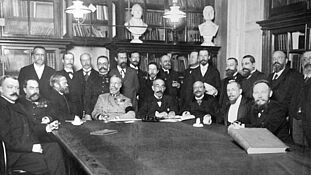* Board Meeting of the Imperial-Royal Geographical Society, around 1898 (Archive of the University of Vienna).
Based at the Austrian Academy of Sciences, this new research project examines (popular) scientific societies in Vienna during the 19th century until the 1920s, as well as their impact on knowledge production, exchange, and popularization in Central Europe. Conceived as bourgeois associations, in which both professionals and amateurs congregated, they played a key role in the establishment of scientific publics, disciplines, and urban spaces. Societies such as the Imperial-Royal Geographical or the Zoological-Botanical Society had up to 2,000 members from different parts of the Habsburg Empire, built up enormous libraries and collections, organized overseas expeditions, exchanged their publications with up to 400 institutions worldwide, and hosted popular lecture events that sometimes drew in larger crowds than those of universities and academies. The political dynamics of WWI, the loss of financial reserves, research areas, and communication networks resulted in a long-lasting rift for the societies - both internally and structurally. Formerly known to be reliable strongholds of state interests, some associations even transformed into rallying points of radical political thinking. A comparative approach, based on research in the archives of (former) scientific societies, reveals new insights in the way science was practiced and organized at different social levels in the Habsburg Empire.
Members of the research team include Johannes Mattes (project leader), Sandra Klos, Daniel Gunz, and Ottilie Manegold.
Contact: Dr. Johannes Mattes
Austrian Academy of Sciences
Vordere Zollamtsstraße 3
1030 Vienna, Austria
Tel. +43-1-51581-4405
Email: johannes.mattes@oeaw.ac.at

